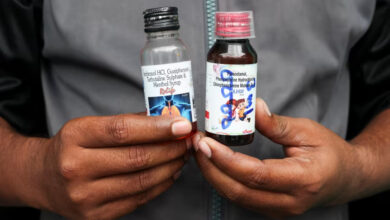
The neighborhood of Awwamiyya, in Luxor, has become the focus of attention since violent clashes occurred between the police and residents there last week, following the death of Talaat Shabib, 47, who died while in police custody last Wednesday. Residents have been protesting against the police over claims that Shabib was tortured to death.
Al-Masry Al-Youm visited the neighborhood, 150 meters away from the Luxor Security Directorate, and met with the victim's family.
Shabib's children recount the night their father died
Shabib had four children, of whom Mohamed, 17, a vocational school student, is the eldest.
"My father was with me since the morning and I left him at 7 pm on Tuesday. At 11 pm, I heard he was arrested. I went to the police station but I was denied entry," said Mohamed. "I was told he was being interrogated.
"Ten minutes later, they told me that my father had some kind of health issue and was transferred to Luxor International Hospital. I headed to the hospital where I found him in the mortuary," Mohamed mentioned.
Mohamed said he witnessed traces of torture on Shabib's neck, back and stomach. "I broke into tears," he added. "I want my father's rights, in accordance to the law, as officials have promised us."
Shabib's second oldest, Mahmoud, 15, is a third grade preparatory school student (ninth grade). Mahmoud said that a few minutes before he was arrested, Shabib bought some household goods and asked him to take them home.
The third son, Badr, 11, a primary school student in the fifth grade, said he was with his father when the police arrested him.
"We were buying biscuits and juice and then we went to the coffee shop. They arrested my father from the coffee shop, beat him and said he possessed drugs," Badr said, denying the accusations.
Other family members give their accounts
Ahmed Youssef al-Rashidy, Shabib's cousin described the altercations that occured after Shabib's death last week.
"The shock is severe, Rashidy said. "I don't know where to start. The police attacked us in homes, terrified women and children, broke our belongings and arrested 24 residents, including four Christians."
According to Rashidy, the police stole gold from the four Christians and forced them to waive the official complaints they filed against the policemen who stole it.
Rashidy went on to express his shock and continued disbelief at what happened to his cousin, adding that Shabib was one of the residents who had protected the police station during the unrest following the January 25 revolution. He went on to describe the night Shabib was taken away.
A police officer had asked Shabib to get into the police vehicle outside a coffee shop, but Shabib refused, said Rashidy. The officer asked another policeman to get him drugs and told Shabib that he would accuse him of possessing drugs. Shabib screamed loudly to eyewitnesses, saying he possessed no drugs, unlike what the police officer was claiming, before he forced into the police vehicle.
Rashidy said he received a phone call an hour later from the police station saying Shabib suffered from some kind of health issue and was transferred to the hospital. He added that he found him dead upon arrival at the hospital and noticed traces of torture on his body.
The doctor confirmed that Shabib had died before entering the hospital, Rashidy said.
"We listened to the voice of reason and buried the victim, and we accepted condolences from people, but there is an oversight in the application of the law."
Shabib's brother-in-law, Ossama Abdel Qader, complained about the way in which the investigation has been handled, saying that the residents are angered because there has been no legal action taken against the policemen accused of killing Shabib.
Shabib is survived by his wife, who holds a bachelor's degree in commerce, and his four children. Shabib was the only breadwinner of the household, selling papyrus products to tourists, Qader added.
Edited translation from Al-Masry Al-Youm




